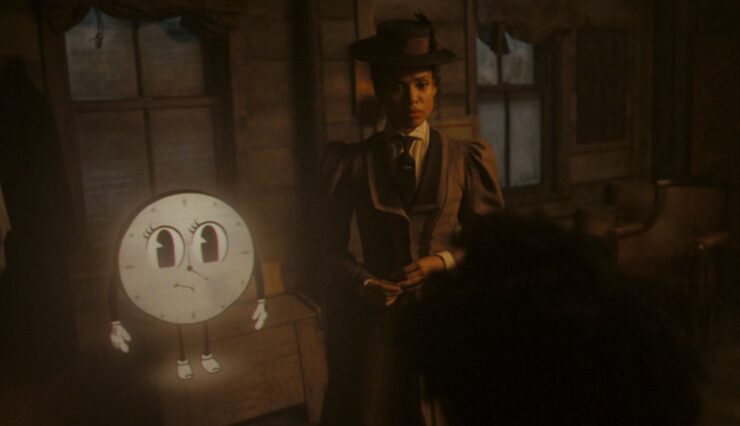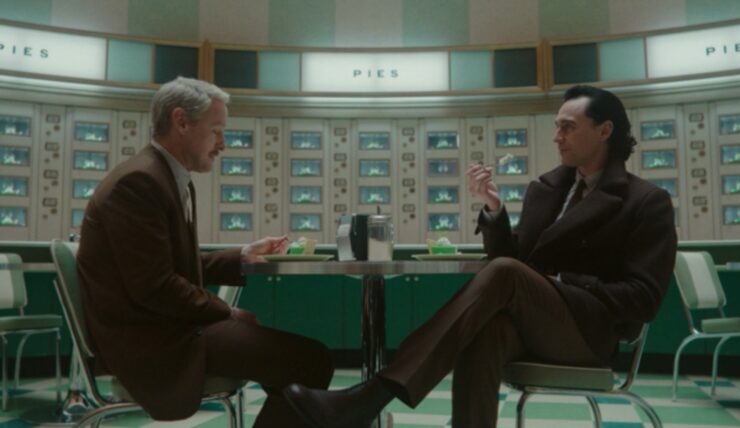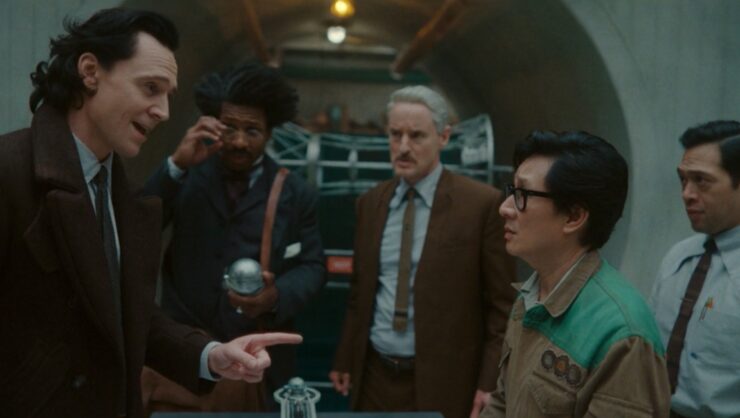As the Marvel Cinematic Universe continues to sprawl and franchise fatigue becomes a term that audiences are increasingly aware of, the question increasingly becomes what branches of the story continue to hold our attention. After Loki’s first season, it’s an understatement to say I was dispirited. The show had some major problems in storytelling, and fell short of the promises made by the head writer around the titular character’s genderfluidity. So despite exciting additions to the cast (like Ke Huy Kuan, my childhood hero), I remained distant and skeptical. Won’t get fooled again, and all that.
So… the second season of Loki was what I’d exactly been waiting for, turns out.
After the finale of season one, we follow Loki (Tom Hiddleston) as he makes it back to the Time Variance Authority after watching another variant of himself (Sophia Di Martino) prepare to murder He Who Remains (Jonathan Majors)—the man who would be Kang. After making a suggestion that none of Loki’s friends from the TVA know who he is in that final scene, the second season thankfully dispenses with that curveball in short order. The confusion is the result of Loki having developed a brand new ability called “time-slipping,” which brings him to different moments in time at the TVA, a place that technically doesn’t have time, but let’s ignore that for now.
There’s a lot of that in the second season of Loki, to be fair: The plot is meant to be a cleverly stitched time travel puzzle, but there are plenty of holes in the picture it makes up, and plenty of deus ex machina employed to cover them. You could possibly argue that using deus ex machina in a story that revolves around a god who is very good at skirting rules and regulations is a feature, not a bug, but that’s for the viewer to decide. And, of course, there are some changes within Loki as a character that make this choice all the more interesting, which I’ll get into below.
Sylvie, the variant who killed He Who Remains thus unleashing endless versions of Kang into the multiverse, escapes to a branched timeline in 1982 Oklahoma while Loki has a realtime panic attack in front of Mobius and the TVA head staff, trying to convince them to take this new He Who Remains variant threat seriously. At the same time, former TVA judge Ravonna Renslayer (Gugu Mbatha-Raw) and admin AI Miss Minutes (Tara Strong) escape into the past and give the TVA handbook to very important young man—the first of those variants, who grows up to be a fellow called Victor Timely.

Back at the TVA, the loom that holds all of time is failing under the new branches that are evolving now that the TVA is no longer pruning them down to a single vein. To help with this and Loki’s time-slipping, Mobius recruits a technician named Ouroboros (Ke Huy Kuan), the guy who literally wrote the TVA handbook. O.B.—a character who pings you right in the childhood if you were a Goonies fan, as he often reads like a grown up version of Data—proceeds to figure out that they’re all going to die if they can’t fix the loom, which requires a He Who Remains variant or Miss Minutes to access… so the chase begins.
The second season knows what it’s got going for it, namely the rapport between Loki and Mobius, and also between their outrageously endearing costars like B-15 (Wunmi Mosaku) and Casey (Eugene Cordero) and O.B. Sylvie, too, is a bright spot of the season, constantly challenging Loki to be more honest and thoughtful about his shifting viewpoints on the universe and his place in it. She’s the person who finally forces him to admit that the entire reason he feels such a pressing need to save the TVA is because these people have become his friends, and he no longer knows who he would be without them.

There’s still a problem in how many of the show’s female characters get depicted, unfortunately. As a compounding of my previous complaint that Sylvie doesn’t get to have any fun at all as a Loki variant, there’s an issue mid-season where nearly all the women on the show come into conflict with the ends that Loki and Mobius are trying to achieve, and several fights that occur on that front. The result is both of our male protagonists repeatedly trying to explain to women that everything they’re attempting is wrong because it doesn’t align with their goals—and, of course, the audience is inclined to see things their way, being the primary vantage points of the show. Loki and Sylvie’s dynamic at least equalizes by the end of the season, with both of them having things to teach the other; which is as it should be as they’re essentially the same person with the benefit of different experiences. But it’s still upsetting that Sylvie isn’t considered important enough within the series to truly receive her own development. She is only ever used to counterbalance Loki’s perspectives.
There’s also an absolutely bananas love triangle that occurs between Victor Timely, Ravonna, and Miss Minutes. And no, I’m not saying bananas because it’s between two humans and a cartoon clock; that’s just funny. The bananas-ness of this choice is in (a) the trend of film and TV writers being unable to conceive of female-coded AI / robots without assigning them romantic inclinations toward the men in their lives, and (b) Renslayer’s entire demeanor flipping upside-down the instant that Timely is gallant toward her. This woman is too competent and too canny to potentially ruin her entire nefarious plan over a day’s worth of flirting. Either spend time developing that dynamic, or don’t bother. And, of course, there’s additional devastating awkwardness to all of this in Marvel’s unwillingness to make any choices around Jonathan Majors’ tenure as Kang, following allegations of domestic abuse that have been brought against the actor.
There are likely going to be accusations of queerbaiting against the show, and I can’t disagree from a critical perspective whatsoever… because we’ve oddly moved from Loki being smitten with Sylvie (and he still is a little, but he’s pulled himself together about it) to being utterly devoted to Mobius in a way that harkens backs to the Cap/Bucky dynamics of old. It’s still not good to queerbait, kids, but I’ll admit to being incredibly pleased that season two of Loki suddenly had me pulling for the God of Mischief to fall into the arms of Owen Wilson. I wasn’t expecting to go on that journey, but then they had a pie date, and rode a tandem bike, and Loki tried to impress the guy by being extremely extra in a James Bond-style footchase, and then smoothed his hair and straightened his jacket when going to speak to a branched-timeline version of Mobius who didn’t know him, so yeah, whoops, this is where I live now? Weird U-turn, but I’m down.

The final episode contains a lot of groundhog-day-esque comedy once Loki has learned to control his time-slipping problem and turn it into another power that would probably make every other superhero envious. (I’m guessing this is an ability that they’ll have to somehow rescind before ever introducing the character into another MCU story because… well, it’s too much power, and way too convenient a fix for any problem outside the one that’s occurring here.) But moreover, the episode addresses one of my key beefs with the first season of the show—namely that He Who Remains offered Loki and Sylvie two options at the end of time, and they both took those options to heart and never bothered to find different solutions, as their characterization demands. This time around, we see Loki once again presented with two options, and he finally gives the response that lives up to his name: I’ll find another way.
There’s another aspect of this season that tickles me personally, which is an unspoken interface with some of my favorite runs of Loki comics, runs where it’s made clear that Loki isn’t just a God of Mischief, but a God of Story. (This was absolutely intentional on the part of the series, it turns out—Loki has actually been redubbed the God of Story by Marvel Studios following the season’s finale.) In many ways, Loki is a metafictional character—not to the extreme extent that, say, Deadpool is, but still similarly situated. He is aware that he is pieces of many narratives, stretched out across time, that he is spoken of as a character far more than a person. To that end, part of his power is wrapped up in shaping story. And that’s what season two of the series allows him; awareness of the narrative, and the ability to rewrite it. But this time, he does it with an eye toward everything he cannot bear to lose.
What I’m saying is, I also didn’t expect this season to depict Loki birthing the multiverse with the power of love? But that’s pretty much exactly what goes down.
The final scenes of the season are about the newly minted God of Story reaching a new state within said godhood; stripped down to his archaic roots, having already spent untold centuries at his task, he finally ascends a throne that is meant for him—one bound up in service to others. “Because that’s what heroes do,” as his brother would say.
Thor would be so proud of this he might explode.

It feels final, and obviously never will be. (Loki and Thor must reunite, for a start, one would hope—Loki hasn’t even met his niece yet.) But this was the path I was hoping the series would take at the outset; far-reaching consequences, a learning journey, a whole lot of historical shenanigans, silly sci-fi mechanics, and the chance for a character who has always been lonely and displaced to create the home he needed. Another season might be fun if they can swing it, but if not, they’ve managed an ending worthy of the prince formerly known as the God of Mischief.
Emmet Asher-Perrin is deeply obsessed with the costuming choices on this show, but particularly that final helm. You can bug them on Twitter and Bluesky, and read more of their work here and elsewhere.










